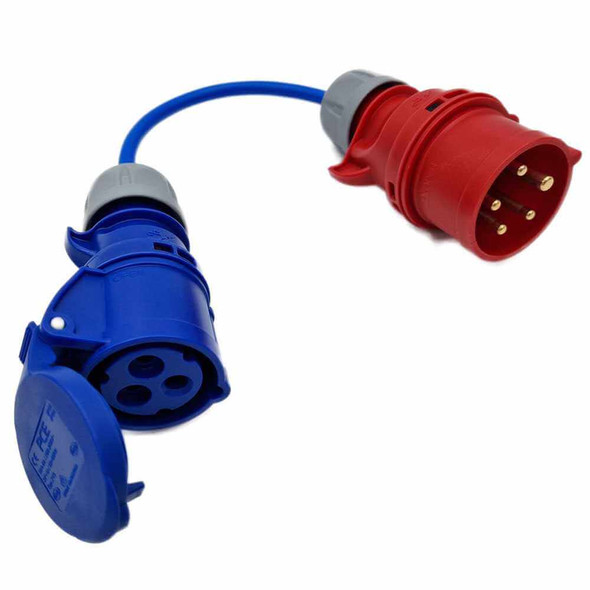Description
MotorCables 22 kW (32 A 3-Phase) AC Power Adapter Cable – Type 2 to CEE 5-Pin Red Connector
When you need serious power, the MotorCables 22 kW Type 2 to 32 A 3-Phase Power Adapter delivers. Designed for industrial users, event technicians, and mobile professionals, it converts any Type 2 EV charging socket into a safe, reliable three-phase mains supply rated for 32 A per phase (400 V AC).
This is the high-capacity sibling of our 11 kW 16 A 3-Phase Adapter — built for when you need double the current and maximum performance.
Key Features
- 22 kW Output: Draws 32 A per phase (400 V AC 3-phase) for heavy duty equipment and industrial power distribution.
- Universal Type 2 Compatibility: Connects to public and home EV chargers across the UK & EU.
- UK-Made 5G6 HO7RN-F Cable: Thick, oil-resistant rubber flex for continuous high-load operation.
- Smart PP Communication: Built-in Proximity Pilot resistor signals 32 A capacity to the charger, enabling safe activation and auto current limiting.
- IP67 Industrial Connectors: Type 2 plug to CEE 5-Pin Red 32 A socket — sealed against dust and water.
- Portable Length: 1 metre for easy storage and low voltage drop.
Related Products & Accessories
- Need less current? Try our 11 kW 16 A 3-Phase Adapter — ideal for motorhome owners and lighter loads.
- Extend your reach with our 32 A Three-Phase Extension Leads with Titanex Cable for industrial-grade flexibility.
- See all models in our Type 2 Converter Category to compare output ratings and options.
Ideal For
- Contractors & Site Teams – Power heavy tools, mixers and distribution units on-site.
- Event & Catering Professionals – Run lighting, ovens or sound systems direct from EV chargers.
- Off-Grid & Emergency Use – Access the grid safely from any Type 2 socket when generators aren’t available.
Technical Details
- Input: Type 2 Plug (L1 L2 L3 N E + PP/CP)
- Output: CEE 5-Pin Red 32 A Socket (400 V AC 3-Phase)
- Cable: 5G6 mm² HO7RN-F Rubber Flex
- Max Power: 22 kW (32 A per phase)
- Ingress Protection: IP67
- Length: ≈ 1 metre
- Compliance: BS EN 60309 / CE / UKCA Certified
Understanding the Power
EV chargers supply the same AC mains electricity you use at home or work. Our adapter’s electronics complete the smart handshake so the charge point activates and delivers full current without an EV connected. When used on a 7 kW single-phase socket, only L1 + N + E are live (230 V 32 A max). On a 22 kW 3-phase charger, all phases energise for 400 V operation at 32 A each.
If using a public network, you may need to end the session in the provider app before unplugging the Type 2 connector.
Why MotorCables?
Each adapter is hand-built and individually tested in Britain to meet BS EN 60309. It’s not just a cable — it’s a precision tool trusted by professionals who know quality counts. That’s why we say:
“That’s why we test them.”
Made in Britain by HDIUK Ltd | MotorCables.co.uk
Frequently Asked Questions
Can I use this 22 kW adapter to power industrial equipment?
Yes. It provides a 400 V 3-phase supply rated at 32 A per phase, suitable for machinery, heaters and site power distribution boards.
What is the difference between the 16 A and 32 A versions?
The 16 A model draws 11 kW (16 A per phase) for motorhome and light use, while this 32 A version draws 22 kW (32 A per phase) for industrial loads.
Do you offer compatible extension leads?
Yes. Our 32 A Three-Phase Extension Leads with Titanex® Cable provide the same heavy-duty build and IP67 protection for longer runs.
Is it legal to use an EV charger for non-vehicle applications?
Yes — it’s standard grid power. Our adapter meets BS EN 60309 and UKCA standards for safe use in workshops and events.
What makes MotorCables different?
We design and test every converter in the UK, ensuring perfect communication with Type 2 chargers and industrial grade durability for real-world use.
















